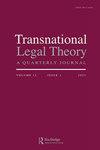对南非来说,COP26的结果是公正的?
Q2 Social Sciences
引用次数: 1
摘要
在COP26上,几个全球北方国家以及欧盟承诺为南非的能源转型筹集85亿美元的资金。这一承诺是由南非、英国、美国、法国和德国政府以及欧盟在“南非公正过渡政治宣言”中作出的。作为回应,南非的民间社会行动者,如气候正义宪章运动,对南非政府是否愿意结束该国对煤炭、石油和天然气的依赖表示了严重的、有根据的担忧。这些参与者提出了一个问题,即这些资金是否将用于促进全球南方国家气候正义的方式。本文以气候正义活动家的声音为中心,采用气候正义的视角,描述和评估了在COP26上对南非的资助承诺,然后反思了民间社会的担忧。本文章由计算机程序翻译,如有差异,请以英文原文为准。
A just COP26 outcome for South Africa?
ABSTRACT At COP26 several global North states as well as the European Union committed to mobilising funding for South Africa’s just energy transition to the tune of $8.5 billion. The commitment was made in a ‘Political Declaration on the Just Transition in South Africa’ by the governments of South Africa, the United Kingdom, the United States, France, and Germany, together with the European Union. In response, civil society actors within South Africa such as the Climate Justice Charter Movement, have expressed serious, well-founded concerns about the South African government’s willingness to end the country’s dependence on coal, oil, and gas. These actors raise questions about whether the funding will be used in a manner that advances climate justice for the global South. Centring the voices of climate justice activists, and adopting a climate justice lens, this commentary describes and evaluates the funding commitment made to South Africa at COP26 and then reflects on civil society’s concerns.
求助全文
通过发布文献求助,成功后即可免费获取论文全文。
去求助
来源期刊

Transnational Legal Theory
Social Sciences-Law
CiteScore
2.10
自引率
0.00%
发文量
7
期刊介绍:
The objective of Transnational Legal Theory is to publish high-quality theoretical scholarship that addresses transnational dimensions of law and legal dimensions of transnational fields and activity. Central to Transnational Legal Theory''s mandate is publication of work that explores whether and how transnational contexts, forces and ideations affect debates within existing traditions or schools of legal thought. Similarly, the journal aspires to encourage scholars debating general theories about law to consider the relevance of transnational contexts and dimensions for their work. With respect to particular jurisprudence, the journal welcomes not only submissions that involve theoretical explorations of fields commonly constructed as transnational in nature (such as commercial law, maritime law, or cyberlaw) but also explorations of transnational aspects of fields less commonly understood in this way (for example, criminal law, family law, company law, tort law, evidence law, and so on). Submissions of work exploring process-oriented approaches to law as transnational (from transjurisdictional litigation to delocalized arbitration to multi-level governance) are also encouraged. Equally central to Transnational Legal Theory''s mandate is theoretical work that explores fresh (or revived) understandings of international law and comparative law ''beyond the state'' (and the interstate). The journal has a special interest in submissions that explore the interfaces, intersections, and mutual embeddedness of public international law, private international law, and comparative law, notably in terms of whether such inter-relationships are reshaping these sub-disciplines in directions that are, in important respects, transnational in nature.
 求助内容:
求助内容: 应助结果提醒方式:
应助结果提醒方式:


